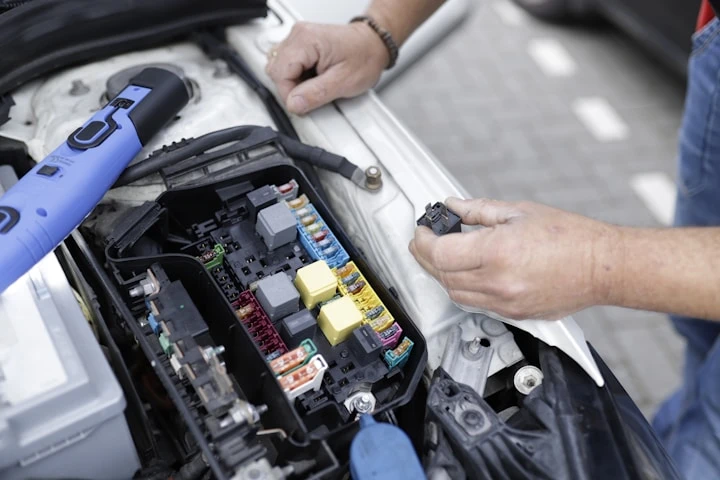🌱 Hybrids 2024: savings or ecology?
In a world where environmental issues and fuel prices are increasing concerns, hybrid vehicles represent one of the most attractive solutions. At the same time, many consumers are still wondering: are hybrids a way to save money or to go green? Find out more about hybrid technologies here.
🚗 Hybrid cars and their place on the market
Hybrid cars, which combine electric and gasoline engines, are occupying an increasingly prominent place in the global car market. This is not surprising given their ability to reduce fuel costs and reduce carbon emissions.
📈 The growing popularity of hybrids
According to statistics, sales of hybrid cars are constantly growing, which indicates increased interest from consumers. This phenomenon can be explained by people's desire for more economical and environmentally friendly vehicles.
💰 Fuel economy as the main motive
The main incentive for many people to buy a hybrid car is fuel economy. With ever-increasing oil prices, hybrid vehicles provide significant savings in the long term.
🌿 Eco-friendliness as an additional bonus
The environmental aspect also plays an important role in the choice of buyers. Hybrids are considered more environmentally friendly due to their lower exhaust emissions compared to traditional gasoline cars.
🌍 Contribution to ecology and sustainable development
Hybrid vehicles make a significant contribution to reducing the carbon footprint and promoting sustainable development.
📊 Emission reduction statistics
Research shows that hybrid cars can reduce carbon dioxide emissions by 25-30% compared to conventional cars. This makes them an attractive choice for those who care about the environment.
🚀 Technologies of 2024
By 2024, hybrid vehicle technology is expected to become even more advanced, allowing for even greater fuel economy and emissions reductions.
🤝 Cooperation with governments and environmental organizations
Hybrid vehicle manufacturers are actively working with government and non-profit organizations to promote environmentally friendly transportation solutions.
💡 Hybrid car technologies
Hybrid cars use advanced technology to achieve high efficiency and environmental friendliness. From regenerative braking to advanced energy management systems, every element is designed with optimization in mind.
🛠️ Regenerative braking
This technology allows energy to be returned back to the car's battery during braking, thereby increasing the overall electric range.
🔋 Improved energy management
Energy management systems in hybrid cars are constantly being improved, allowing for more efficient use of electric and gasoline energy.
🔄 Integration with intelligent systems
Integration with smart vehicle systems allows drivers to optimize fuel consumption by analyzing driving style and road conditions. Such systems are able to adapt to different operating conditions, providing maximum savings.
📊 Comparison of savings and environmental friendliness
For many car owners, it is important not only how much they can save on fuel, but also what their contribution to the environment is. Hybrid cars offer the optimal combination of both of these characteristics.
📉 Economic aspect
Comparative analysis shows that hybrid vehicles can significantly reduce fuel costs. This is especially true in light of rising oil and gasoline prices.
🌳 Ecological factor
From an environmental perspective, hybrids offer reduced emissions, which helps improve air quality and combat climate change.
🌐 Hybrids in different countries
The approach to hybrid vehicles varies around the world depending on economic conditions, environmental goals and government support policies.
🇺🇸 USA
In the United States, hybrid vehicles are being actively promoted as a means to meet national carbon reduction goals.
🇪🇺 Europe
European countries such as Germany are focusing on developing infrastructure for electric vehicles and hybrids by providing various incentives and subsidies.
🌎 Global trends
There is a trend around the world towards stricter environmental regulations and standards, which encourages manufacturers to pay more attention to the development of hybrid and all-electric models.
🔄 Transition to hybrid cars
The transition to hybrid cars is not only a fashionable phenomenon, but also a balanced decision that helps both save the family budget and protect the environment.
📋 Hybrid transition plan
Switching to a hybrid requires understanding current and future mobility needs, as well as considering the vehicle's charging and maintenance infrastructure.
💸 Cost of ownership
The cost of owning a hybrid vehicle can be higher due to the cost of the batteries and the complexity of the system. However, in the long run, the fuel savings may outweigh the initial costs.
📝 Summary of the benefits of hybrid cars
Hybrid vehicles are an increasingly popular choice for today's car enthusiasts, offering a balance between fuel economy and reduced emissions while delivering comfort and performance comparable to traditional cars.
🌱 Contribution to sustainable development
Choosing a hybrid vehicle makes a significant contribution to sustainable development, helping to reduce dependence on fossil fuels and supporting environmental initiatives.
🚗 Technical innovation
The technical innovations behind hybrid vehicles open up new opportunities for automakers and consumers, setting new standards for efficiency and environmental friendliness.
📈 Growing popularity
The growing popularity of hybrid vehicles reflects changing consumer preferences and increases pressure on manufacturers to continuously improve technology and improve the environmental performance of vehicles.
🏆 Conclusion
Choosing a hybrid car in 2024 is not just a trend, but a conscious decision in favor of economy and the environment. Taking into account global environmental challenges and economic trends, hybrid vehicles are the optimal choice for responsible and modern drivers.

